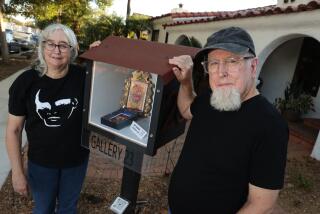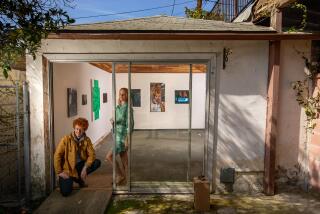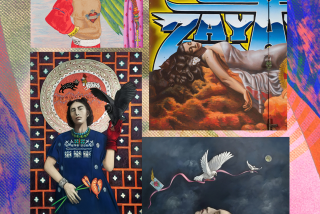Art swap: That 50-cent thrift-store painting? It might be a Lorenzo Hurtado Segovia original
Like many artists, Lorenzo Hurtado Segovia makes work for galleries and museums. But unlike many artists, he regularly gives his work away to thrift shops.
For five years, the L.A.-based artist has been represented by CB1 Gallery downtown, where his pieces sell for anywhere from $750 for a print to $35,000 for wall-sized works. Earlier this year he had a survey of his works in a solo exhibition at the Vincent Price Art Museum at East Los Angeles College.
But for roughly a decade he has also been making work explicitly to donate to thrift stores — a selection of which is on view in the rear office gallery at CB1.
SIGN UP for the free Essential Arts & Culture newsletter >>
“There is this fetish for original art — the desire to have the original,” he explains of the project. “I thought, well, maybe there’s something interesting here. Maybe I can distribute the original, but in a way that’s irregular.”
His series named “Segundas” (Seconds) plays with this art world fetish as well as with the overheated nature of the art market, where sale price is always everything. For all Hurtado knows, his work could be sitting at a Goodwill in Van Nuys with a price tag of 50 cents.
The series works this way: During his regular forays into thrift stores, Hurtado looks for framed works that are handmade.
“It can be a painting or an embroidery,” he explains, “but it has to be something that someone made by hand and it has to be in a frame.”
He takes the piece back to the studio and creates a new work, in the same dimensions, inspired by what he found in the frame. This, he says, has the effect of opening him up to imagery that he might not otherwise make on his own. (Much of Hurtado’s work is abstract.)
“For a contemporary artist, making a painting of a bouquet of flowers or butterflies or that kind of imagery is not hip and cool,” he says. “But that is the subject matter you find at a thrift store.”
In this manner, Hurtado has made pictures of a dolphin, a dog, a deer and a sunset — but with contemporary artistic flourishes. That means bold, geometric swaths of primary colors, abstracted elements and quirky additions, such as a wrestling type mask on a young girl.
Hurtado then takes this new work and slips it into the thrift-store frame. It is photographed and the photographs are dispensed to his dealer to sell. The painting itself, however, is donated to one of many thrift stores he frequents around the Los Angeles area.
“I distribute them primarily in the Valley — from Tarzana to Glendale,” says Hurtado, who signs the paintings the same way he does all his work, with an X and the date. “I have no idea who gets them or if anyone will get them. Someone could say, ‘What a hideous painting.’”
Hurtado says he enjoys working on the series since it pulls him out of his regular area of focus (he is known for elaborate woven paper abstractions). But with the segundas, he is forced to look at throwaway objects with a more considered eye.
“The materials people use are all over the place,” he says. “Some are quick pencil sketches on paper. Some are very laborious, with cross-stitching, collage and photography.”
And he is interested in the stories these thrift-store pieces tell.
“I think of a thrift store as a hopeful place for pictures,” he adds. “These are things that someone made by hand. And somehow this picture ended up at a thrift store. So I think that the piece had to have been emotionally valuable enough for the person donating it, otherwise they would have thrown it away. It’s like they’re hoping someone will pick it up.”
Ultimately, however, the purpose of the series is to turn the art market on its head.
“Someone might have an original, but it’s not the typical art collector,” he explains. “In this case, the art collectors get the reproduction.”
Hurtado has made roughly 20 segundas, which, over the years, have quietly landed in thrift shops around L.A.
“I think of it as tongue in cheek,” he chuckles. “When you exit through the gift shop, you are getting reproductions of famous paintings. But my paintings aren’t famous. I’m generating a product for no demand.”
But he sees a beauty in it too: “A segunda is a metaphor, in a sense, for a second life.”
Lorenzo Hurtado Segovia’s “Segundas” will be on view at CB1 Gallery through Sept. 5. 1923 S. Santa Fe Ave., downtown Los Angeles, cb1gallery.com.
Find me on Twitter @cmonstah.
More to Read
The biggest entertainment stories
Get our big stories about Hollywood, film, television, music, arts, culture and more right in your inbox as soon as they publish.
You may occasionally receive promotional content from the Los Angeles Times.











